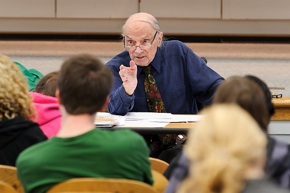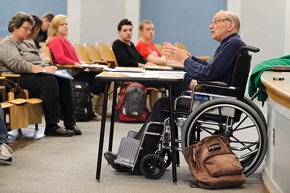At 80, Harold Scheub keeps the storytelling tradition alive
As the African Studies Program celebrates its 50th anniversary, Harold Scheub remains a constant.
A force of nature since arriving on campus in the 1960s, Scheub, Evjue-Bascom Professor of Humanities in the Department of African Languages and Literature, celebrated his 80th birthday last August.

Harold Scheub, professor of African languages and literature, has been teaching this and other classes for four decades.
Photo: Jeff Miller
Years after many professors have retired from teaching, he inspires yet another generation of students to explore ancient and modern cultures unknown to most Americans.
“Harold is a legend in the history of this university,” says former chancellor John Wiley. “Students sometimes waited years to get into his class. They all left with the feeling that they had experienced something extraordinary.”
These days, Scheub doesn’t bound across the stage like he used to. Though he is known for walking up and down the African continent, mobility issues over the past few years have led him to teach from a chair at the front of the room. Still, his voice rings as clear as ever, easily carrying through one of the largest lecture halls on campus.
Each semester, Scheub teaches a mix of graduate seminars and undergraduate courses, on topics ranging from African myth to the hero and trickster.
By far, however, he is best known for African 210: The African Storyteller. Mixing ancient tales and modern literature, Scheub shares the bounty of African cultures through their words.
“I like to think that I’m a conduit for Africa – that students become aware of an Africa that they may not have known existed,” says Scheub. “And I love it. It’s very exciting to break down stereotypes.”
In Scheub’s Van Hise Hall office, books are secondary. From floor to ceiling, the walls showcase his memories: pictures of the people with whom he worked in Africa, African masks, notes and drawings from mentors and mentees around the world.
“We never could figure out when the man slept, given his high level of activity as a teacher, scholar and department member,” says Robert Cancel, associate professor of African and Comparative Literature at UC-San Diego, a PhD student during the 1970s.
“Harold is someone who will convince you that the literary production coming from Africa is not only world-class, but better. He has a way with spellbinding prose, read aloud or delivered extemporaneously, that reminds you why literature and the arts are so vital to our culture.”
Scheub took a roundabout path towards teaching. After serving as a jet mechanic during the Korean War, the GI Bill funded his degrees in English literature. Seeking more travel, he spent two years teaching in Uganda on the cusp of the nation’s independence.

A wheelchair does little to curb Harold Scheub’s passion for teaching an African Storytellers class in Bascom Hall.
Photo: Jeff Miller
“Africa was never in my future, but I’d always been interested in it, so I leapt at the chance,” says Scheub. “I totally, utterly fell in love with it.”
When he returned to the United States, he decided that his Ph.D. would shift to African Languages and Literature. At that time, as now, UW–Madison had the only graduate department in that field. The political climate in Uganda had worsened under dictator Idi Amin, so Scheub decided to study under A.C. Jordan, a political exile from apartheid South Africa.
“I wasn’t too keen to go to South Africa, but he said, ‘How are you going to teach about apartheid if you don’t actually see it?” recalls Scheub. “I learned at the feet of these great teachers. Nobody wrote – and I didn’t want to write things down anyway; all they needed in apartheid Africa was for some white guy to be taking notes.”
Of the 10 years he spent in Africa, he spent four walking up and down the coast. Eschewing interpreters or translators, he recorded poetry, epics, tales and myths – over 10,000 examples, including some stories that could last for days.
Once Scheub returned to UW–Madison as a professor, the African Storyteller course emerged in the 1970s. Students spend half a semester on the oral traditions of Africa and half on written work, including five novels.
Sitting in 272 Bascom, Scheub launches into the lecture, spelling out the names of unfamiliar words and characters and rapping the table for emphasis. He pauses intermittently to ask questions – always a dicey prospect in large lectures, but an example of the attention he expects from his students.
Scheub’s course administration is just as legendary as his style. He eschews the use of teaching assistants, even while grading hundreds of his infamous essay exams by hand.
And woe to any student arriving at 11:01. While Scheub does not tolerate latecomers, they still crowd around the closed door, unable to sign in but hoping to catch his lecture from the hallway.
“Harold is a legend in the history of this university. Students sometimes waited years to get into his class. They all left with the feeling that they had experienced something extraordinary.”
Former Chancellor John Wiley
“My feeling is that, hey, this is my class and I need to know what the students are doing,” says Scheub. “This is where the students really show that they’re mastering this material. If I can’t understand that, what the heck kind of teacher can I be?”
Scheub’s legacy will remain strong thanks to the UW Libraries, who have digitized and preserved his original recordings. The collection is all the more valuable given the fact that Scheub’s research could not take place today.
“The intellectual property rights to content in Harold Scheub’s collections are enormously complex,” wrote Ken Frazier, former director of the UW–Madison libraries, in an introduction to Scheub’s book South African Voices.
“Professor Scheub and the library believe that these cultural works belong to performing artists and to the people of South Africa. Digital copies of the entire Scheub collection will be deposited in the University of Cape Town library to ensure the best possible prospects for long-term preservation and access to the collections for the people of South Africa.”
The vast differences between the 1960s and today’s global culture have little impact on the stories’ power.
“Ancient myth is as real as a story that we hear today,” says Scheub. “It was such a wonderful experience to come to this conclusion. As human beings, we tell the same stories. They unite us. Storytellers would tell me: these stories are not truth. They’re a way of getting at truth.”
Despite his years at the head of the class, the challenge of telling the same story to a different audience never gets old.
“Up until the point when I start talking, I’m really nervous,” says Scheub. “I’ve never gotten over it. Once that stops happening, I should probably quit. But once I start talking, I’m okay.”



